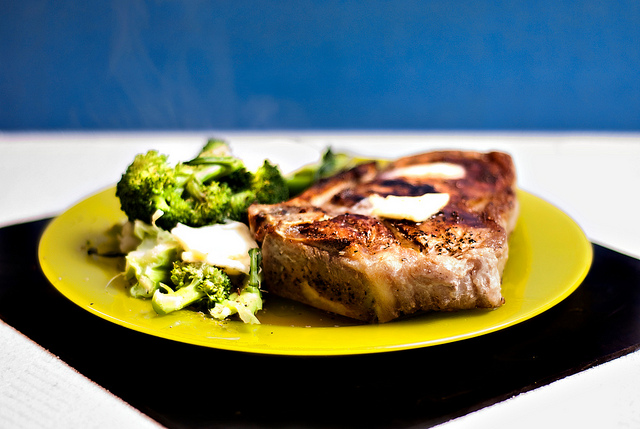Calories. Calories. Calories. It’s all the rage. It’s all about calories. You’ll hear this often. You’ve heard this often. Calories are the answer; the mass controller of your body composition. It’s quite simple, really. Eat less than you need, you lose weight. Eat more than you need, you gain weight. And that’s it. That’s all that matters. More and [...]

Calories. Calories. Calories. It’s all the rage. It’s all about calories. You’ll hear this often. You’ve heard this often. Calories are the answer; the mass controller of your body composition.
It’s quite simple, really. Eat less than you need, you lose weight. Eat more than you need, you gain weight. And that’s it. That’s all that matters. More and less.
Since you were the tiniest cell, an embryo, your life has been shaped by nothing more than a (+) or a (-). When you’re (+), the excess is dumped into the vault, forever to be locked away until you churn away the contents. Calorie by calorie. Until your (-) extracts your (+) down the utmost specific decimal. Oh, wait, that can’t be! We don’t measure half calories, so it must be whole numbers. Yeah! Until your (-) extracts your (+) down to the utmost specific whole number.
So you’re good as long as your (+). You’re alive. You’re full of energy. Just be (+). Maybe that’s what they told the pirates . . . right before they died of scurvy. But how can that be? Scurvy isn’t a (+) problem. I thought it was all about the (+)?
Maybe the (+) — the calories — isn’t all that matters. Maybe, just maybe, there’s more.
Eat anything you want and lose fat like Godzilla
You can eat ice cream. You can eat Twinkies. You can eat whatever you want and lose weight . . . as long as you control calories. As long as you’re (-), you’re good. But what’s “good?”
I don’t care who you are, if you have Kwashiorkor you won’t be sporting a slender tummy anytime soon. And Kwashiorkor is more than a calorie problem, it’s a protein problem. The pirates that died of scurvy had more than a calorie problem, they had a vitamin problem. When you don’t get enough iodine and you develop a thyroid problem and your suffer a typical symptom of hypothyroidism in weight gain, you have more than a calorie problem. You have a nutrient problem.
We often forget that food is more than calories; food is nutrients. And nutrients make the calorie castle begin to crumble.
No, no no…it’s all about nutrients!
If it’s not all about calories, then it’s all about nutrients. Right?
Alas, starvation exists. An energy problem. No one sustains life on a multivitamin alone.
The fact that this argument exists — that there is a chasm between nutrient and calorie — is interesting to me. For the long withstanding history of humans, calories and nutrients were a package bundle. Food had both.
Run through the list of, I dare say, “paleo” foods and you’d be hard pressed to find many without a combination of both — even among the so called “dangerous” carbohydrates, like potatoes. (For the record, if you’re new to reading my stuff, I don’t think potatoes dangerous. Familiarize yourself with my sarcastic air quotes for the future.) Animal parts (especially organ meat) and things that grow from the ground are some of the most nutrient rich things available to us. And yes, there are differing amounts of calories in each.
It wasn’t until we started manufacturing our own food that we ended up with synthetic shells of high calorie, no nutrient foods and no calorie, high nutrient pills. The implications of this, I think, are much deeper than we realize.
The real calorie burner
One of the reasons I hate the “it’s all about calories” mindset is that it neglects under the hood metabolic processes — processes that are aided by vitamins and minerals. Our basal metabolic rate — the functions that happen just to keep us breathing and alive — consume the bulk of our energy. Unless you’re doing hardcore prolonged exercises, you aren’t going to touch your BMR (in terms of calories burned) with a typical training session.
This then means that the more processes that go on under the hood, the better our metabolism (from sheer calorie consumption) would then function. Thiamine helps nerve function and metabolism. Riboflavin helps vision, metabolism, and skin health. Niacine helps the nerves, metabolism, and digestion.
It makes sense — to me, at least — that our metabolism (from an energy consumption standpoint) would be better off when we have the stuff necessary to fully use these physiological processes.
Say one guy chucks back nutrient void Twinkies. He may consume 1000 calories, and since his BMR is 2000 calories, he’ll lose weight.
But if another guy chucks back 1000 calories of nutrient rich food, it would only make sense (to me) that his BMR would increase because his body would have the nutrients it needs to function at a higher capacity. Maybe, just maybe, his BMR would be higher — 2500 calories. (As we know, “under the hood” metabolic processes use a lot of energy.)
Another example that might resonate a little more: a guy just did some quality strength training. He trashed his muscles, and the body is looking to recover and replenish them. Say he eats enough protein and nutrients for his body to use for the previous purpose. His body would then churn through silent physiological processes and do its thing.
But what if he didn’t eat any protein or any nutrients towards the cause. Would his overall metabolic rate share the same fate?
It’s hypothetical; that’s the point.
IIFYM then? Is it the answer?
One step back from the “it’s all about calories” mindset is the “if it fits your macros” (IIFYM) mindset, which is another bone I might as well pick.
IIFYM accepts that, at some basic level, different foods and nutrients have different functions in the body. But it also generally accepts that all macronutrients are created equal. This grinds my gears because it suggests that we we have some semblance of an idea of how many macronutrients/calories we need, how many macronutrients/calories were actually getting. And I think most of our estimates of either aren’t really all that close.
The shame of nearly every calorie based “diet” is that most people fail to understand (they don’t want to understand, really) that the body never has the same physiology day after day — we don’t burn a consistent amount of calories.
Most metabolic calculators ask for height, weight, body fat, and activity level, but these don’t really tell the whole story. You can burn 170 calories per hour playing the violin, which is just about as much as you would burn walking the track. No metabolic calculator would factor in violin though.
How can you burn that many calories playing violin? The brain is, pound for pound, one of the most metabolically active structure in the body. Challenging it in a complex way is another one of those “under the hood” process.
On top of this, just because you exercise doesn’t mean you increase the amount of calories you burn.
More activity doesn’t mean more calories burned

There was an interesting study done (that I first saw on Nerd Fitness) that compared energy expenditure among Americans / Europeans and the Hadza people of Tanzania (one of the few true “primitive” tribes left who often cover 15-20 miles of ground daily gathering food).
This is what they found:
We found that despite all this physical activity, the number of calories that the Hadza burned per day was indistinguishable from that of typical adults in Europe and the United States. We ran a number of statistical tests, accounting for body mass, lean body mass, age, sex and fat mass, and still found no difference in daily energy expenditure between the Hadza and their Western counterparts.
How can the Hadza be more active than we are without burning more calories? It’s not that their bodies are more efficient, allowing them to do more with less: separate measurements showed that the Hadza burn just as many calories while walking or resting as Westerners do.
We think that the Hadzas’ bodies have adjusted to the higher activity levels required for hunting and gathering by spending less energy elsewhere. Even for very active people, physical activity accounts for only a small portion of daily energy expenditure; most energy is spent behind the scenes on the myriad unseen tasks that keep our cells humming and our support systems working.
So no, just because you threw bunk numbers into a vague and inaccurate metabolic calculator online doesn’t mean you’re going to make use of that many calories and then whatever calories you need from the extra activity you’re doing.
(Don’t worry, I’m getting to a point of all of this . . . I think.)
Can a macronutrient at least be a macronutrient? Can it be easy?
Proponents of IIFYM will say that a calorie is a calorie under the umbrella of a specific macronutrient. In other words, there’s no difference between one gram of carbohydrate via ice cream or one gram of carbohydrate via broccoli — a statement that debunks the common idea of eating healthy foods over slop because a carbohydrate is a carbohydrate, no matter the source.
True? Here are two studies that bring us to murky waters.
A recent study found that individual humans who ate, as part of an experiment, 600 or 800 calorie portions of whole wheat bread (with nuts and seeds on it) and cheddar cheese actually expended twice as much energy, yes twice, in digesting that food as did individuals who consumed the same quantity of white bread and “processed cheese product.” As a consequence, the net number of calories the whole food eaters received was ten percent less than the number received by the processed food eaters (because they spent some of their calories during digestion).
The above was taken from Rob Dunn’s website. And then there’s this study which showed that rats that ate powdered food gained weight, but those that ate pellet food didn’t, even though the calories were rather equal.
Just about the same foods (in the rat example, same food exactly), yet a different result.
Although we aren’t rats, you can’t but wonder about how much the actual process of digestion — regardless of how many calories a food is said to have measured via calorimetry (as digestion is much more complex) — impacts what actually happens to nutrients and the true energy it takes to assimilate.
If it’s not solely about calories and not solely about macronutrients, then what’s it all about?
Why are we looking for universal?

Take a look around. No two people are the same. And yet we want to believe that every single body processes every single calorie and every single nutrient . . . the same? And that there’s one thing that caused the obesity epidemic.
We want to believe . . .
That a 200 pound bodybuilder uses nutrients the same as a 100 pound grandma?
That a person that’s overfed on calories for 100 straight days handles nutrients the same way as a person that’s been in-and-out of starvation, struggling to survive, for 100 straight days?
That the moment you go 3500 calories above your metabolic rate, you automatically add one pound of fat somewhere on your body?
That Kobayashi gains pounds of fat overnight after his hot dog eating contests?
That growth spurts in which pounds of muscle are added to bodies from hormones is an accepted truth, yet hormones absolutely can’t matter when discussing energy balance?
That when you eat 1 calorie over your allotment for the day it becomes 1/3500 of a pound of fat?
That hyperthyroidism causes weight loss because of calories, not hormones, and hypothyroidism causes weight gain because of calories, not hormones. (Can hormones impact hunger? Did your head just explode?)
That your body operates on a 24 hour clock and shuts off saying “any calorie consumed beyond this hour then counts towards the next window of calorie processing.”
And that last one is my biggest question to you, Mr. Calorie.
Even after all of this, you can still troll out and say, “it’s still about energy balance.” Regardless of how much any one food effects metabolic rate, it’s still about energy in and energy out.
But what’s the clock? We talk about eating more than needed, but that suggests there’s a distinct start and stop time. When do the body’s accountants sit down, close the door, and crunch the numbers to determine if you went over or under?
We don’t operate in 24 hour segments. It’s easy for us to think in these terms because that’s the world we’ve created. Eat 1000 over your allotment for the day, gain weight overnight — pull the Kobayashi. Because, technically, if you eat 2000 calories in ten minutes, you’re over on calories for those ten minutes . . . but not the entire day. So what happens?
Beginnings, not endings
These questions aren’t meant to be answered, but rather meant to be pondered.
At some point, you have to acknowledge that the body — in some way — makes some sort of decision on how to handle its metabolic rate and nutrient distribution based upon the environment. We change. We aren’t static. We’re plastic, and we adapt to better survive in the environment we’re used to living in.
This is how we build muscle. If a calorie was a calorie and processed universally, the body would never build muscle. No nutrients or energy would ever be shuttled to the muscles for growth.
It’s not all about calories, just as it’s not all about nutrients. It’s not all about any one thing. As Robert Anton Wilson said in Prometheus Rising:
The Aristotelian idea that to understand something you must know what it is has been abandoned in one science after another, for the pragmatic reason that the simple word “is” introduces so many metaphysical assumptions that we can forever argue about them.
Expecting universal rules is a disservice to the body. And to take it even further, to think our body and brain (the most complex structure we know of) functions in strict (+) and (-) like a calculator is even more asinine.
To peg all of our problems on one thing is stupid. So yes, whenever you click that banner ad that says “one weird trick to help you lose body fat,” you are stupid. Over and over again, we see that you can’t understand a complex system by breaking it into separate parts because the whole comes together to create something vastly different than the parts.
Yet, we’re still all about the parts.
Controlling calories…is it good advice for you?
I write all of this not to showcase how smart I am. I wouldn’t do such a thing because, realistically, I’m dumb. I won’t pretend like I know that it’s all about calories or that it’s all about whatever because I don’t. That’s why I don’t count calories. That’s why I sometimes eat very very little, and why I sometimes eat very very much. That’s why I embrace chaos: I don’t know any better.
At some point, you’re going to have to tell yourself a story. And then you’re going to have to believe it. I don’t know of many people that “make it” that truly, 100% believe it’s all about calories. No one I know in the performance realm doesn’t take some care to eat vegetables and wholesome proteins. No one eats solely fried foods and vats of sugar with an eye on calories and makes radical changes in their body composition.
In the end, everyone that is changing their body and exploiting their own plasticity is jousting for answers. We suit up and ride into the arena. If we get knocked off, we look for answers. Was it the armor? The horse? The lance? The ground? The crowd? The opponent? The sun?
And then we piece together what we believe over time based on what seems to work best (what Nassim Taleb would inevitably call heuristics), which isn’t necessarily the same advice that studies spit out, because you can find studies proving and disproving just about everything when it comes to body composition.
It’s my experience the “calorie” advice is handed down to the masses because it’s simple. Average people that want average results don’t want to actually have to do any work. Talking beyond calories flies over their head, so the simplest advice becomes: just watch how much you eat; control calories and you’ll be good. It’s easy enough to sound like it works. Forbid changing your physiology actually be difficult.
(Hint: it is.)
+++++
Photocredit: steak and broccoli, hadza, snowflake